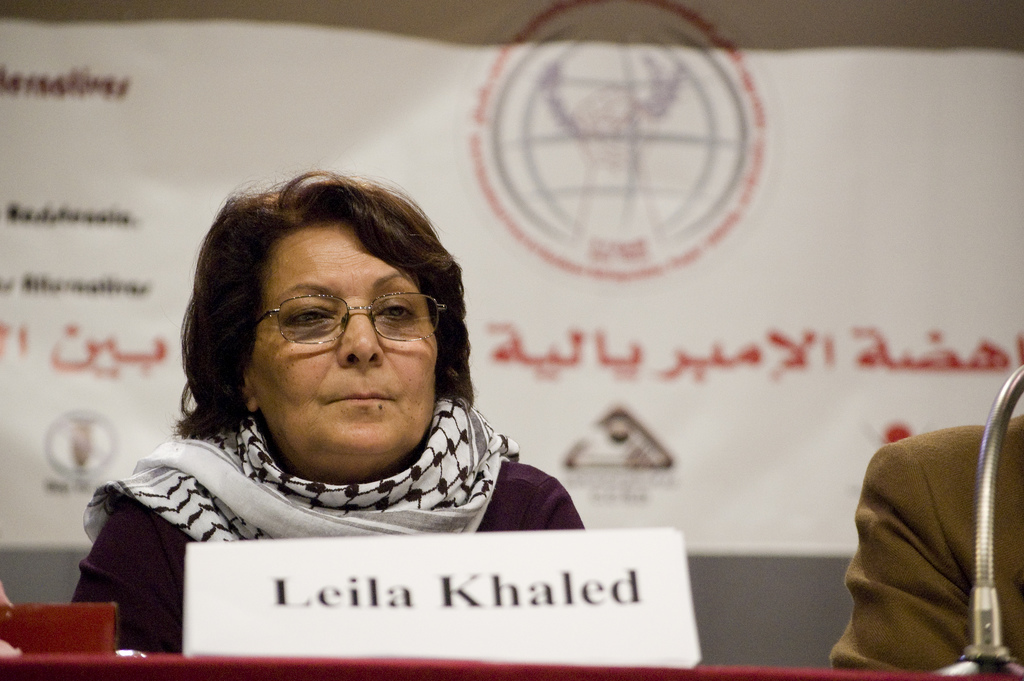KHALED, LEILA (1944-)
Born in Haifa in April 1944; fled with her family to Lebanon during the 1948 War; grew up in Sour Refugee Camp; became an activist of the ANM in 1956; enrolled at the AUB in 1962, where she was also involved with the GUPS; for lack of funding, was unable to continue her education and went to Kuwait in 1963 to assume a teaching position; was there recruited to the PFLP in 1968; joined its Special Operations Squad and received paramilitary training in Amman; hijacked a TWA flight from Los Angeles to Tel Aviv during a stopover in Rome on 29 Aug. 1969, diverting the plane to Damascus where it was destroyed; after a 44-day stand-off, Israel released two Syrian prisoners of war in exchange for two Israeli hostages; participated in another hijacking of an El Al airplane on 6 Sept. 1970, but was overpowered and the pilot diverted the aircraft to London where she was detained by British police; freed a little later on 1 Oct. when Britain, West Germany and Switzerland exchanged captured Palestinians for 310 civilian hostages who were held in four simultaneous hijackings in Jordan; returned to Beirut and joined a combat unit; escaped a bed-bomb believed to be planted by the Mossad, but her sister was shot dead on Christmas Day 1976; became a member of the PFLP’s Central Committee; member of the PNC; led a PLO delegation to the UN Decade for Women conference in Copenhagen in 1980; enrolled at a university in Russia for two years in the early 1980s, but was ordered by the PFLP to combat in Lebanon before completing her studies; was elected first Secretary of the Palestinian Popular Women’s Committees (PPWC) in 1986; lived in Damascus in the early 1990s, then settled in Amman, where she works as a teacher; entered mainstream Palestinian politics but remained PFLP member; in Feb. 1996, was allowed by Israel briefly to enter Palestinian-ruled areas, or at least the Gaza Strip, to vote on amending the Palestinian charter; has written several articles as well as her autobiography My People Shall Live (London: Hodder and Stoughton, 1973).

ولدت في مدينة حيفا عام 1944 ؛ لجأت مع عائلتها إلى لبنان خلال أحداث النكبة الفلسطينية عام 1948 ؛ نشأت وترعرعت في مخيم صور للاجئين الفلسطينيين؛ أصبحت ناشطة في حركة القوميين العرب عام 1956 ؛ التحقت بالجامعة الأمريكية في بيروت عام 1962 واتحاد عام الطلبة الفلسطينيين؛ لم تتمكن من إكمال دراستها بسبب عدم توفر الإمكانيات المالية وذهبت إلى الكويت عام 1963 لتعمل في مهمة التعليم؛ انضمت إلى الجبهة الشعبية لتحرير فلسطين عام 1968 ؛ وعملياتها الخاصة وتلقت تدريباً عسكرياً، قادت أول “عملية اختطاف طائرة” T WA متوجهة من لوس انجلوس إلى تل أبيب خلال توقف الطائرة في روما في 29 آب/ أغسطس 1969 ، محولة اتجاه الطائرة إلى دمشق؛ شاركت في عملية اختطاف لطائرة ثانية من نوع إل عال “ El Al ” الإسرائيلية في السادس من أيلول/ سبتمبر 1970 ولكنها لم تنجح في إكمال مهمتها وحوّل الطيار اتجاه الطائرة إلى لندن حيث قامت الشرطة البريطانية باعتقالها؛ أفرج عنها في الأول من تشرين الأول/ أكتوبر عندما قامت كل من بريطانيا، وألمانيا الغربية، وسويسرا بتبادل الفلسطينيين المقبوض عليهم مقابل 310 رهينة مدنية من المحتجزين في رابع عملية اختطاف مشابهة في الأردن؛ عادت إلى بيروت؛ نجت من عملية اغتيال يعتقد بأن الموساد الإسرائيلي قام بزرع قنبلة في منزلها ولكن شقيقتها توفيت في يوم عيد الميلاد عام 1976 ؛ أصبحت عضو في اللجنة المركزية للجبهة الشعبية لتحرير فلسطين؛ عضو في المجلس الوطني الفلسطيني؛ قادت الوفد الفلسطيني في مؤتمر UN Decade for Women Conference الذي عقد في كوبنهاجن عام 1980 ؛ انتسبت للدراسة في جامعة في روسيا لمدة سنتين في أوائل الثمانينات؛ انتخبت أول سكرتيرة في لجان المرأة الشعبية الفلسطينية عام 1986 ؛ عاشت في دمشق في أوائل الثمانينات، ثم استقرت في عمان حيث عملت في مهنة التعليم؛ سمحت لها السلطات الإسرائيلية في شباط/ فبراير 1996 بالعودة إلى قطاع غزة لحضور اجتماعات المجلس الوطني الفلسطيني وللتصويت على تعديل الميثاق الوطني الفلسطيني؛ كتبت عدة مقالات وكذلك سيرتها الذاتية يجب أن يعيش شعبي لندن: هودر وستوجتن، 1973
